Determining if your Dachshund is considered a senior dog is far more complicated than a simple number.
Veterinarians, scientists, and researchers now agree that breed, size, and overall physical condition all play major roles in determining what makes your dog a senior.
While there’s no longer a standard calculation for aging dogs, you can still determine when your Dachshund is becoming a senior.
Here we’ll talk about the factors that play a role in your Dachshund’s age status, and discuss how to make your Doxie’s elderly years happy and enjoyable.
When is a Dachshund Considered a Senior?
According to the AKC, the official lifespan of a Dachshund is about 12-16 years.
Small breed dogs generally live much longer than large breed dogs, but there are many factors that will contribute to a Dachshund’s lifespan.
Dachshunds are considered to be seniors later in life than breeds such as a Mastiff or Great Dane.
Some giant breed dogs only live to be about 7-9 years old, but those years may not even be the beginning of senior life for a Dachshund.
Dogs are considered seniors depending on what size they are, not necessarily what age they are in human years.
The term “senior” can be thrown around the pet owner community pretty loosely because not all breeds are created equal.
A Dachshund may just be gaining senior status at 10 years old, whereas a Labrador Retriever may be enjoying the end of their life by then.
Basically what we’re trying to say is, your dog is a senior when they are showing signs of being a senior.
Now, what is considered old for a Dachshund?
Ultimately it’s up to you to make that determination, but an old Dachshund is usually no less than 10 years old.
Senior status is a combination of both physical condition and age, just like humans. In some places, 55 years old is considered “senior” for humans, but in many parts of the world, 55 is only middle age!
In the end, your Dachshund is considered a senior based on their physical state, mental state, and age.
Many Doxie owners classify their dogs as seniors when they reach 11-13 years old.
Dachshund Aging Chart – How Old is My Dachshund in Human Years?
Ok, ok, we said above that there’s no longer a standard calculation for aging dogs.
However, you are probably still curious so even an estimate would be helpful.
The below chart shows the approximate age of a Dachshund in human years vs dog years.
I included two columns because Dachshund’s come in two sizes – miniature and standard – and they can vary from approximately 6 lbs to 40 lbs, depending on their size (weight) classification.
In other words, how much your Dachshund weighs affects their age in dog years.
Note: this chart assumes your Dachshund is at a healthy weight. Being overweight is one of the medical conditions that can cause your dog to age faster.
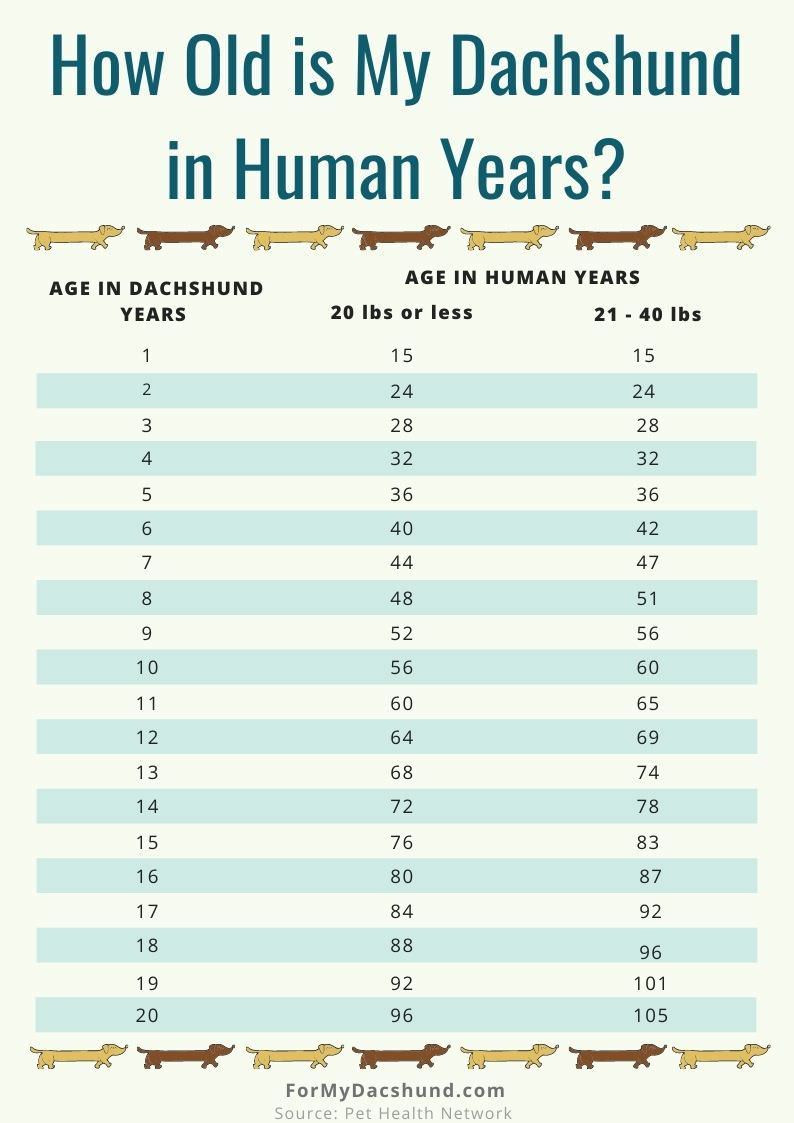
So, for example, you might be asking..
How old is a 13 year old Dachshund in human years?
In human years, a 13 year old Dachshund is 68 years old, assuming that it’s a miniature or “Tweenie” weighing under 20 lbs.
How old is a 15 year old Dachshund?
A 15 year old standard Dachshund that weights over 21 lbs is equivalent to being about 83 human years old.
But there are plenty of 76 year old humans continuing to live life to the absolute fullest!
The old rule of thumb was that a canine ages 7 human years for every 1 dog year.
While this popular standard of dog-aging has been widely accepted in the past, researchers have realized that it’s not the most accurate equation.
Small dogs age slower once they reach five years old.
Small and large dog breeds tend to age the same until they reach about 5 years old.
After that milestone, small breed dogs begin to age more slowly than larger dogs.
It’s crucial to remember that even though 5 years old may seem young to us, that’s almost middle-age for a Dachshund.
Senior Dachshund Health Problems
The most common Dachshund health issues can strike at any age but the ones that are most likely to develop in senior Dachshunds are dementia, Cushing’s disease, congestive heart failure, cancer, fatty tumors, and jaw and teeth issues.
Once you believe your Dachshund is heading into their senior years, it’s recommended to get a senior blood panel.
A senior blood panel can give your vet a baseline that future blood tests can be compared to in order to help detect signs of disease in your pup, which can help you treat and possibly cure them before they become bigger issues.
Many senior Dachshunds will sleep more than they did in their younger years.
While it’s common for seniors to take longer or more frequent naps, it is important to keep track of your dog’s sleeping routine in case there have been any drastic changes that need to be addressed with your veterinarian.
Controlling health concerns quickly and early can keep your Dachshund living longer and healthier in their golden years.
And remember that proactive wellness checkups and vet visits throughout your Dachshunds life will help them maintain the healthiest life possible!
How to Care for a Senior Dachshund
All senior dogs require a bit of extra care, and they deserve it for the unconditional love they showed us throughout their years!
Yearly wellness exams with your Dachshund’s vet are necessary, and will help you determine when your dog may be ready for their first senior blood panel. After the results come in, you can work on a health plan moving forward.
You may need to take your senior dog to the vet more often to stay ahead of their health changes.
Senior Dachshunds may require more frequent vet visits, and that’s okay! You want your dog to be as happy and pain-free as possible.
Dogs in their golden years may also require extra care such as ramps to reach furniture, more cuddle sessions, or glucosamine supplements for their hips and joints.
Also, some senior dogs, Dachshunds included, can become incontinent or have potty issues.
Potty pads and doggy diapers are excellent options for these types of scenarios.
Many senior Dachshunds need to have teeth removed in their older years, but wet diets or semi-moist food can ensure your dog is getting the nutrition they need.
Most pet food brands also make diet varieties specifically for our senior pets.
Senior Dachshunds need and deserve extra love and care, and they’ll be happy to provide plenty of smiles and affection in return.
Final Thoughts
Dachshunds grow into their senior years around 11-13 years old.
Every dog is different, and each one will show unique signs of aging into a senior.
If you’re still unsure of whether or not your Dachshund is a senior, make an appointment with your trusted veterinarian.
They will be able to give you the best advice on how to move forward with your Doxie’s wellness plan depending on their age and physical state.

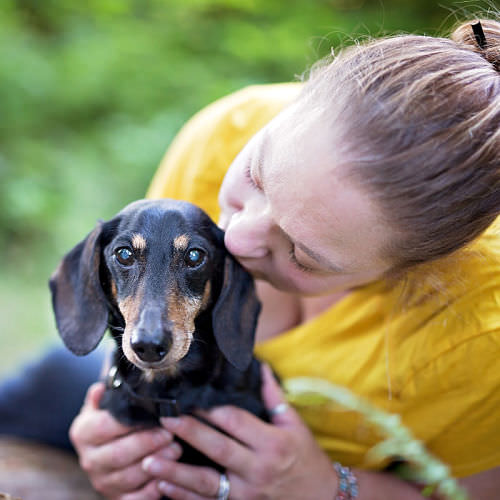
About the Author: Through her 17 years of owning and caring for Dachshunds, and almost 10 years researching and writing about them, JW has become a respected expert in the Dachshund community. Read more about her here.

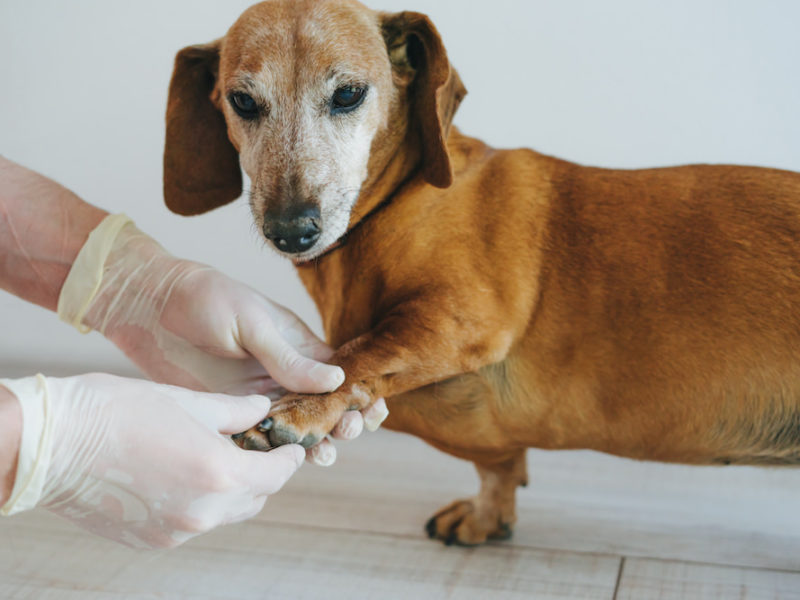


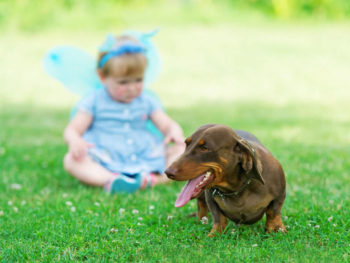

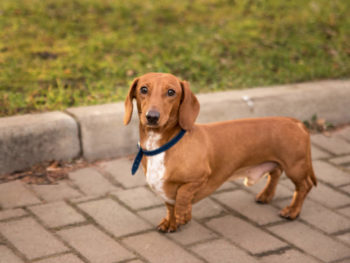




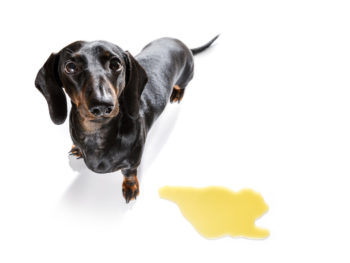

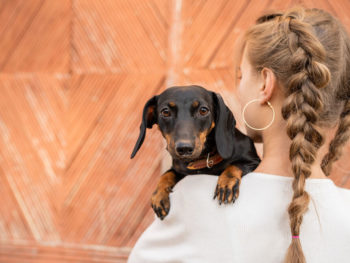
 Why is My Dachshund Shaking?
Why is My Dachshund Shaking?


